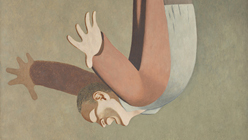HELP DESK is where I answer your queries about making, exhibiting, finding, marketing, buying, selling–or any other activity related to–contemporary art. Submit your questions 100% anonymously here: http://bit.ly/132VchD. All submissions become the property of Daily Serving. Follow us on Twitter: @ArtHelpDesk
This week’s column features the artwork of David Byrd, whose solo exhibition Introduction: A Life of Observation is currently on view at Greg Kucera Gallery in Seattle. Mr. Byrd is 87 years old and this is his first gallery show. As Kucera puts it in the press release, “There have been a number of ‘discoveries’ in the art world lately. This one is the real deal.”
I am an artist and art teacher of 15 years. I am ready to get out of teaching mode and into something new and becoming an art consultant is highly appealing to me. I have a BA in Art History and an MA in Transformative Arts. I simply do not know the first steps I should take to start this new career. I don’t want to own my own business — obviously I am not yet qualified for that. I would like to work in an established art consulting firm. I’ve searched the web and can’t find any. Can you give me some pointers?
If you’ve been reading this column for a little while you already know that I champion pencil-and-paper brainstorming, so get your writing hand warmed up. Make a list of everything you think an art consultant does, and then for each of those tasks, I want you to list the sub-tasks and skills that are necessary to accomplish each item. For example, if one of the duties of an art consultant is to stay abreast of developments in contemporary art, one of the subtasks might be subscribe to gallery mailing lists, the skill for which is research. Take 20 minutes and a couple of pieces of paper, and work out all of the different things that you think you are going to have to do to be successful.




